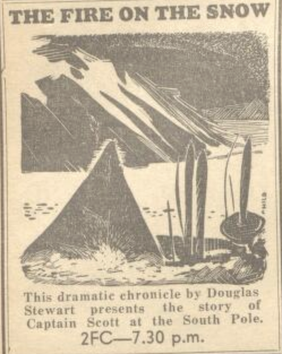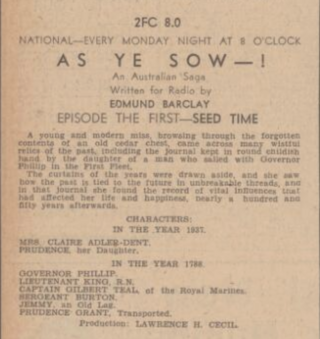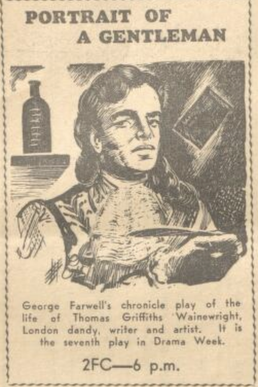Related Research Articles
Gwendolyn Mina Munro was an Australian actress best known for playing the female lead in Orphan of the Wilderness (1936).

The Fire on the Snow is a 1941 Australian verse play by Douglas Stewart about the Terra Nova Expedition to Antarctica by Robert Falcon Scott. It premiered on ABC radio on 6 June 1941 to great acclaim and inspired a series of Australian verse dramas on ABC radio.

Lady in Danger was a play by Australian writer Max Afford. It was one of the few Australian plays to be produced on Broadway. It was also adapted for radio and television.
The Little Sheep Run Fast is a 1940 Australian play by Sumner Locke Elliott. Being a drama, it was a change of pace from his first two stage plays which were both comedies.
Ned Kelly is a 1942 radio play by Douglas Stewart about the outlaw Ned Kelly.

As Ye Sow is a 1937 Australian radio serial by Edmund Barclay. It told the story of six generations of Australians in early colonial Australia.
The Playwrights' Advisory Board was an Australian organisation established in 1938 to assist the cause of Australian playwriting. It was established by Leslie Rees, Rex Rienits and Doris Fitton. Its functions included negotiating productions with theatres, acting as an intermediary in the nomination and collection of royalties, advising theatres and playwrights on scripts, and holding script competitions. Members of the board included names such as Dymphna Cusack and Sumner Locke Elliott.
Red Sky at Morning is a 1935 Australian stage play by Dymphna Cusack. The play helped launch Cusack's writing career and was filmed in 1943.
Daybreak is a 1938 Australian play by Catherine Shepherd.

Portrait of a Gentleman is a 1940 Australian radio play by George Farwell about Thomas Griffiths Wainewright. It was the first time Wainewright's life had been dramatised.

The Remittance Man is a 1939 Australian radio play by Richard Lane. It was one of the most acclaimed Australian radio plays of the 1930s.
Mingled Yarn is a 1937 Australian radio play by Edmund Barclay about the life of William Shakespeare. It was broadcast on the ABC for Australian Drama Week.
Shout at the Thunder is a 1942 Australia play by Gwen Meredith. It had a rural setting of the kind Meredith would so successfully exploit on radio.
Ask No Questions is a 1940 Australian stage play by Gwen Meredith. It had an all-female cast. Meredith wrote it at the request of Doris Fitton who wanted some plays without no men, because male actors were hard to get with the war on.
A Sirius Cove is a 1935 Australian comedy play by Lionel Shave.
The Daughter of the Dragon is a 1938 Australian musical radio drama with music by Frederick Whaite, who worked for the ABC. It was a light musical comedy, set in China. Book and lyrics were by Muriel Leslie and D. Bowes Kelley.
Royal Mail is a 1939 Australian stage play by Alexander Turner.
Wheat Boat is a 1942 Australian radio play by Alexander Turner. It was bought for the ABC.
Exit Socrates is a 1939 Australian radio play by Catherine Shepherd. It was considered one of the more notable Australian radio plays of that year.
The Drovers is a 1921 Australian play by Louis Esson. According to Esson's obituary the play was his "finest piece... one scene, one simple incident; it was what he could do; be never did anything better; and no one else did, either."
References
- ↑ "Witty Comedy". The Sydney Morning Herald . No. 31, 481. New South Wales, Australia. 24 November 1938. p. 5. Retrieved 24 July 2023– via National Library of Australia.
- ↑ Rees, Leslie (1953). Towards an Australian Drama. p. 124.
- ↑ "The Drama in Australia". The West Australian . Vol. 55, no. 16, 553. Western Australia. 22 July 1939. p. 5. Retrieved 24 July 2023– via National Library of Australia.
- ↑ Australasian Radio Relay League. (July 20, 1940), "Play Wrights of Australia Comedy and Sophistication", v. ; 24-38 cm., The Wireless Weekly: The Hundred per Cent Australian Radio Journal, vol. 35, no. 29, Sydney: Wireless Press, nla.obj-720018818, retrieved 24 July 2023– via Trove
- ↑ Australian Broadcasting Commission. (8 June 1946) [1939], "Gwen Meredith Is Writing Lawsons Novel", v.: ill. ; 29cm., ABC Weekly, vol. 8, no. 21, Sydney: ABC, nla.obj-1334110414, retrieved 24 July 2023– via Trove